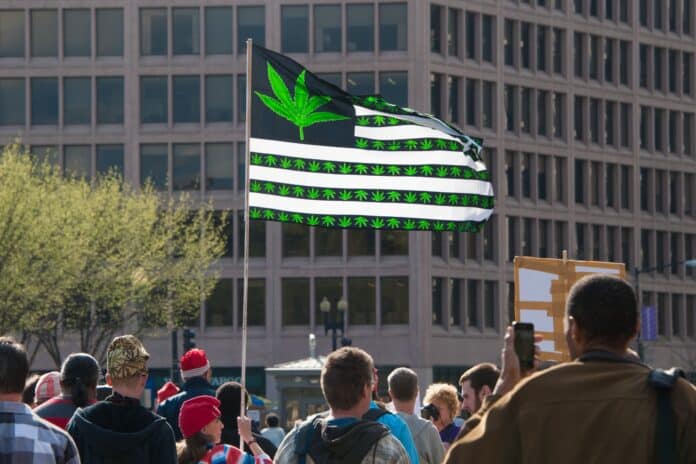
The Minnesota Supreme Court has ruled that the Legal Marijuana Now Party (LMNP) did not meet statutory requirements to be considered a “major party” in Minnesota.
Issuing its ruling Friday, the court directed the Minnesota Secretary of State’s Office to “take all appropriate actions necessary to reflect that the Legal Marijuana Now Party is not a major political party in Minnesota” for the upcoming 2024 elections.
In short, the LMNP has been stripped of its major party status, thus leaving the Minnesota Republican Party and the Democratic-Farmer-Labor Party (DFL) as the only organizations in the state that enjoy major party status.
Ken Martin, the chairman of the DFL, brought the lawsuit that eventually stripped the LMNP of its status. In Minnesota, political parties possess either major party status, minor party status, or no status.
To be considered a major party, a political party must field a statewide candidate who receives votes in every county and at least eight percent of the total vote, or field a certain number of candidates for Congress, the Minnesota Legislature, and state constitutional offices.
Additionally, a political party can receive major party status by gathering signatures equivalent to five percent of the previous general election’s total vote count.
For a political party to be considered a minor party, the requirements include fielding a statewide candidate who receives votes in each county that amount to at least one percent of all votes cast, or gaining signatures equivalent to one percent of the votes cast in the previous general election.
Political parties that have major party status receive an uncontested, automatic place on the state primary ballot and state general election ballot, along with several other benefits.
In bringing the lawsuit challenging the LMNP’s major party status in February, DFL Chairman Ken Martin said, “The Legal Marijuana Now Party very clearly did not meet the requirements to qualify for major party status.”
Specifically, the DFL issued a press release which said the LMNP did not meet statutory requirements which compel major parties to hold regular political conventions and maintain executive committees which govern the party.
On Friday, the Minnesota Supreme Court granted Chairman Martin’s petition, saying “the LMNP failed to maintain a state central committee subject to the state convention’s control, as required by section 202A.12, subdivision 2.”
State law requires political parties which have major party status to maintain a committee which governs the statewide operations of their party. According to the Supreme Court’s ruling, amendments to state law in 2023 made maintenance of this state central committee a necessary component of possessing major party status.
Given the Court’s conclusion that the LMNP did not maintain such a committee, the Court stated, “we thus hold that the LMNP has failed to satisfy the requirements to be a major political party.”
Chairman Martin released a statement shortly after the court’s decision.
“We’re pleased that the Supreme Court has recognized that the Legal Marijuana Party did not satisfy the statutory requirements to be treated as a major party,” said the chairman. “If the Legal Marijuana Now Party wants to run candidates for office, they can still get on the ballot using the same process available to other third parties. Major party status comes with major party responsibilities, and only the Minnesota DFL and Minnesota GOP have consistently met that standard.”
In addition to finding that the LMNP did not meet requirements to be considered a major party, the Supreme Court directed Secretary of State Steve Simon to “consider whether the Legal Marijuana Now Party has met the requirements to be a minor political party in Minnesota.”
In turn, Simon said in a press release that the party “will need to file a notice” with his office “that it met the requirements to be listed as a minor political party.”
“Legal Marijuana Now candidates may still appear on the ballot on the November 5, 2024 General Election if they collect the necessary amount of petition signatures: 2,000 for statewide races, 1,000 for congressional races, and 500 for legislative races,” Simon’s office said. “Signatures must be collected during the candidate filing period between May 21 and June 4 for all contests except for President and Vice-President, which can be collected until August 30.”













